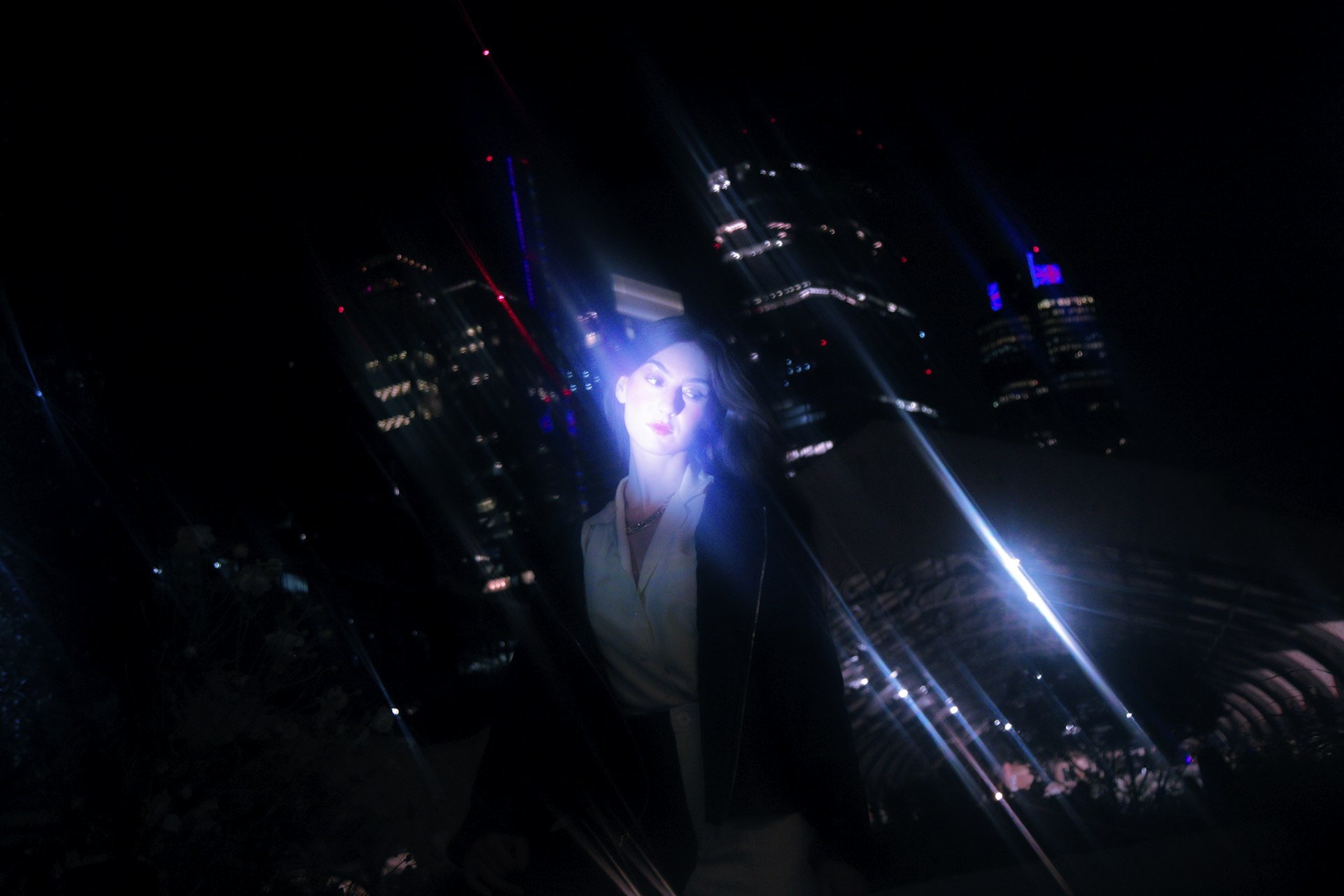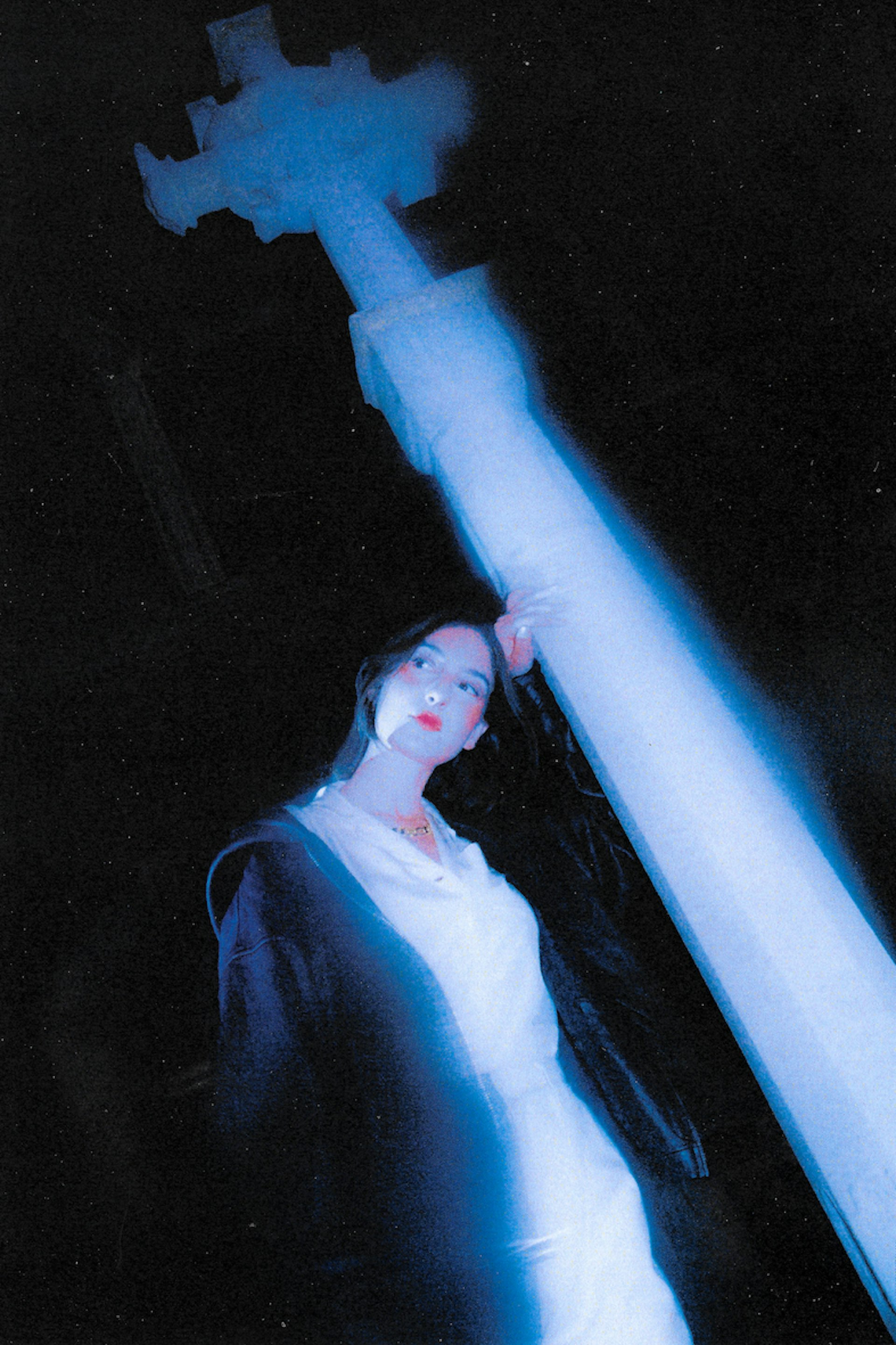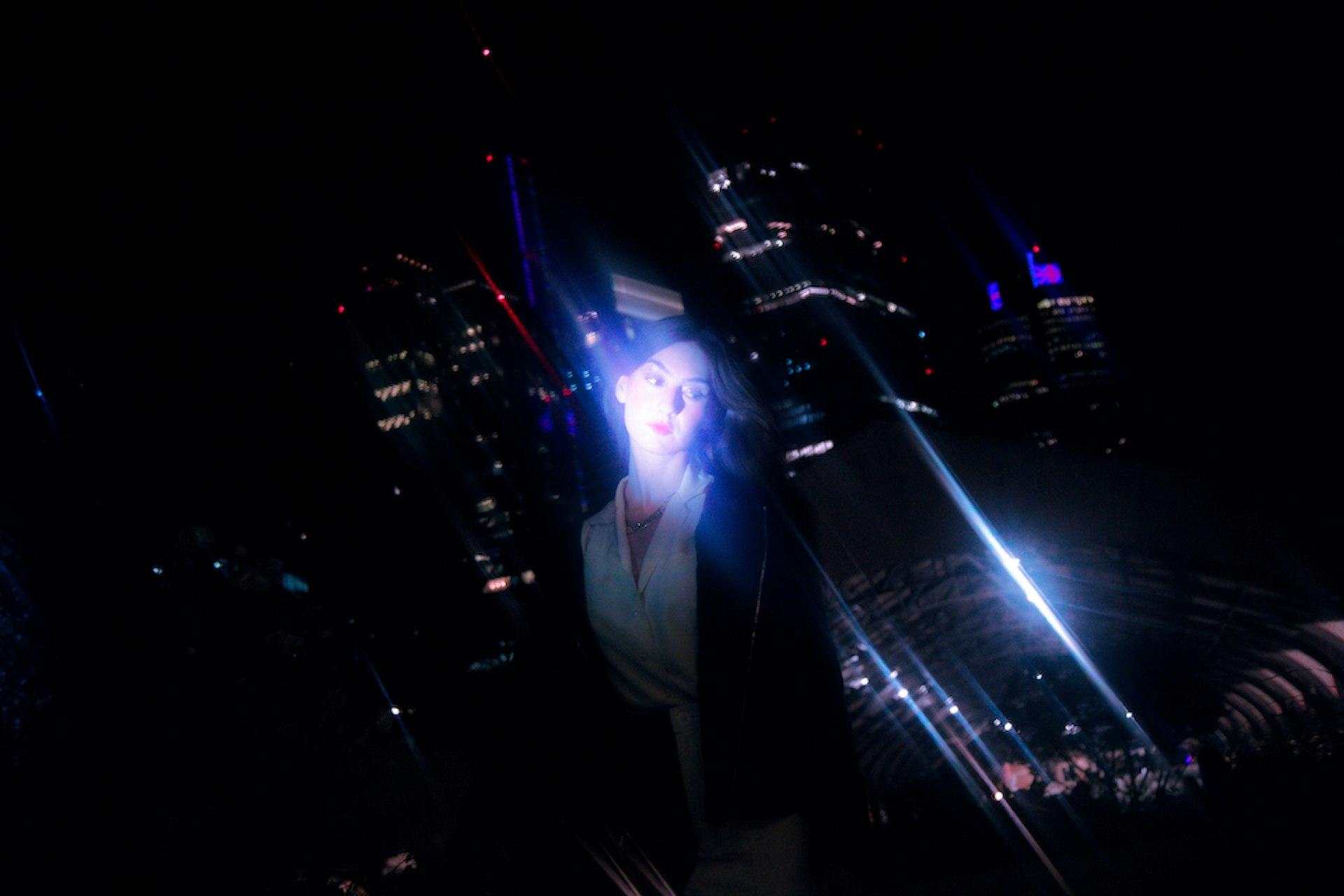
Weyes Blood wants to help you let go
- Text by Thomas Hobbs
- Photography by Neelam Khan Vela
When Nico was struggling to write songs, her lover Jim Morrison advised the mysterious singer to keep a notepad by her bedside table and scribble down her dreams. Just like the poet William Blake, The Doors frontman believed the fables within our subconscious were in fact spiritual guides that writers had a responsibility to follow and be inspired by.
This is a technique singer songwriter and musician Weyes Blood (real name Natalie Laura Mering) very much believes in. “My dreams are particularly insane, to the point of being quite stressful,” the 34-year-old tells me. “I tend to write a lot of them down, so that they can influence my music.
Techniques like this go a long way to explaining why the music of Weyes Blood – which operates almost exclusively in the grey area between blissful dreams and existential nightmares – is so unique.
As a songwriter, Mering is Princess Zelda if she sang the blues, possessing the same combination of elegance and world weariness. One of the hardest things an artist can do is speak universal truths without coming across as condescending or preachy, but this is something Mering routinely excels at, with the mainstream success of her 2019 album, Titanic Rising, giving listeners a collection of eternally wise, tender anthems to get through these wild times with.

“No one’s going to give you a trophy / for all the pain that you’ve been through,” she delicately coos on the project’s core, ’Mirror Forever’ – an immersive electro folk song about learning to love a damaged reflection and finding yourself in a world where trauma has become its own strange form of social currency. Even further back, on 2016’s ‘Generation Why‘ – a sad waltz that comes across like a eulogy to self-loathing millennials – an organ whimpers as the singer comes to the profound realisation that “you can’t love others if you don’t love yourself”.
These are brilliant songs that can at first feel crushing. However, by the time they reach their conclusion you feel cleansed and finally ready to get out of bed – a transformational process that recalls the raw, purgative storytelling of legendary songwriters like Joni Mitchell, Anne Briggs, and Patti Smith. “Holding onto pain is not living in truth” is the howl at the centre of ‘Requiem for Forgiveness’, an even earlier Weyes Blood song from an era when Mering’s songs were far less pretty than they are today, and much darker in their noise rock experimentation.
I tell Mering that this particular lyric feels like her mission statement as an artist. “Holding onto something, and your grasp causing some sort of internal suffering, is very much a Buddhist understanding of things,” is her philosophical reply. “If you think of a monkey grabbing a fistful of sweet rice, well, it can’t eat the rice so long as it has a clenched fist, right? It has to learn to let go and be prepared to lose something.”
She explains further: “I like to tap into the idea that we must all let go of our expectations to get out of this existential doom, and that it’s okay if we don’t live the care-free lives that our carefree parents led. I want my music to help people let go, so that they can finally start to live their lives.”

Mering’s road to Weyes Blood has been anything but conventional. Growing up in a staunchly Christian household in Doylestown, Pennsylvania, Mering turned to music to escape the trappings of enforced faith. As a teenager, she recalls sitting under a brood of cicada insects in the family garden, which were collectively creating a clicking noise that, at 100 decibels, was stronger than the whirr of a speeding motorcycle.
Armed with a four-track cassette recorder, Merling pressed play, using the insects’ strangely relaxing hums and mating buzzes as a trigger to start singing. “For me, singing was this strange trance. Yes, I would write love songs, but my music back then was more textural and about completely zoning out so that I could escape my reality.”
Stints as the bassist of the chaotic Portland band, Jackie-O Motherfucker, and lead singer of Santanised (a band title that I’m sure gave Mering’s parents a few nightmares) followed, but the artist really found her calling as a solo artist, who was more interested in locating grace than anarchy. And since debut The Outside Room, her solo albums, all released under the moniker of Weyes Blood (itself a reference to a Flannery O’Connor novel), have gotten better and better.
Back on this 2011 debut, Mering helplessly sang about sitting on “jagged rocks, counting waves”, her heartbreak patently obvious. Yet on ‘A Given Thing’, a highlight of the new album, And In The Darkness, Hearts Aglow, Mering comes to the galvanising realisation that “love doesn’t need to destroy you anymore”. It is a full circle moment, with the artist finally realising her inner strength and breaking free from the literary cliché that true love must equate to pain. Meanwhile, new song “Grapevine” is perhaps the most Americana ballad of Weyes Blood’ career, as Merling grapples with the ghost of James Dean and mourns the loss of the pre-internet American dream.
Of this striking new music, which feels more optimistic than anything Weyes Blood has ever put out before, Mering says: “This record tries to make sense of the modern disillusionment. It’s about what happens to intimate relationships at a time of the disintegration of the social fabric.”
Huck spoke to the artist known as Weyes Blood about ghost stories, the beauty of reaching your 30s, being a helpless romantic, and how she defines her faith.
On your new song ‘The Worst Is Done’ you have this line where you say: “I got kind of old / it got to me kind of quickly”. There’s something quite beautiful about getting old, right? Where did that lyric come from?
In the middle of the pandemic, I definitely got the OG strain of Covid-19 and it really messed me up. Thankfully I am better now, but there was a time where it aged me like five years. It’s funny, because I am only just starting to look normal again!
I’m at that point in my life where it is really important to be establishing roots, whether that is professionally, romantically, or even just through friendships. Your time feels extra valuable in your 30s, as it’s not as disposable as it was in your 20s. Lockdown, and I guess getting sick with Covid-19, really made me wake up [to my mortality]. I guess that lyric also speaks to the stress of having my first real success of a record with Titanic Rising and it being shut down due to lockdown. We still had a lot more touring to do, but suddenly it was all over!
Writers often frame your music as “beautiful” and “ethereal”. Can that ever feel limiting?
I guess people say that because there is so much femininity in my music. It is really tough because, yes I am a big romantic at heart, but I also come from this experimental noise music background. The only reason I started making pretty music was because it’s what I realised I was best at; it wasn’t a desired goal from the onset. So, yes, I do get a little bent out of shape if someone tells me my music is beautiful.
Even if it’s meant well, a lot of things can be beautiful, so it’s a word that doesn’t feel very unique, you know? It’s kind of like telling a singer she is angelic. On one level, it doesn’t feel like a compliment, but on another, it’s the biggest you could possibly get from someone. I guess when terms like ‘ethereal’ start to become used in a stereotypical way, that’s when it becomes a problem. I think beauty is one thing, but flawed beauty or decayed beauty are much more interesting [concepts].
You worked on a Lana Dey Rey album and now headline massive venues. Do you sometimes miss it when the expectations were maybe a little smaller?
It is sad but yes, I do miss playing solo. I had full control and everyone’s expectations were so low, which meant I was always able to always impress people. There is more pressure when there’s a big team around you and you have to be, like, their leader. There is more space to lose the magic when the operation starts to get bigger and you’re suddenly surrounded by this big group of musicians.

In the past you’ve talked about being exposed to Christianity from a young age, and ultimately breaking free. Instruments like the piano and organ are so synonymous with going to Church. By using these sounds so often in your songs, are you reclaiming something?
Yeah, for sure. The people in those religious schools, well, I could really tell when they were being legalistic and tripping on their own ideas, opposed to trying to get in touch with something genuine. I still feel like I am trying to play into some sort of transcendent message, but just not under the dogmatic guise of modern Christianity.
When I denounced Christianity as my faith, I was around 13 or 14. I got super into Eastern philosophy and Buddhism, because it was all so elemental. It used similar principles to Christianity, but not in such an anthropomorphised way, which I found really valuable. My favourite verses in the bible actually lean to Buddhist thinking, but my favourite Buddhist sayings lean more towards Jesus. I love the meeting points of these different cosmologies and how two completely disparate cultures can come to similar conclusions; there is something special in that and you can salvage some real truth from it.
A song like ‘Picture Me Better’ does such a great job of humanising the grieving process. Your music so often feels haunted by something… what do you think about the idea of ghosts?
As far as what happens when you die, I think you get reabsorbed back into the fabric of time and space. If you let go and do it all easily, that is heaven. If you hold on and don’t want to let go, maybe that is what a ghost is.
I had a friend, who lost his wife who was an actress. One day he’s watching TV and a scene with her pops up, where she’s looking directly into the camera and saying “I love you”. It was a beautiful moment for him, but I also guess as humans we’re prone to apophenia and trying to find patterns to make sense of our things. This is a big part of our survival.
If it all stopped tomorrow, how would you want people to remember Weyes Blood as a project?
I think with this record, and my last, I became really good at articulating a modern malaise and sense of existential dread. I guess I hope they would say I made songs that were true and from someone who wasn’t just trying to be a star. I want to be seen as a vehicle for other people to experience their own truths. Yeah, that would be nice.
And In The Darkness, Hearts Aglow is out on 18 November on Sub Pop Records.
Follow Thomas Hobbs on Twitter.
Enjoyed this article? Like Huck on Facebook or follow us on Twitter.
